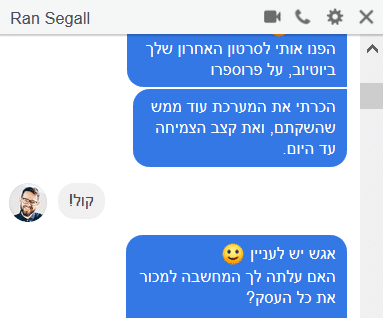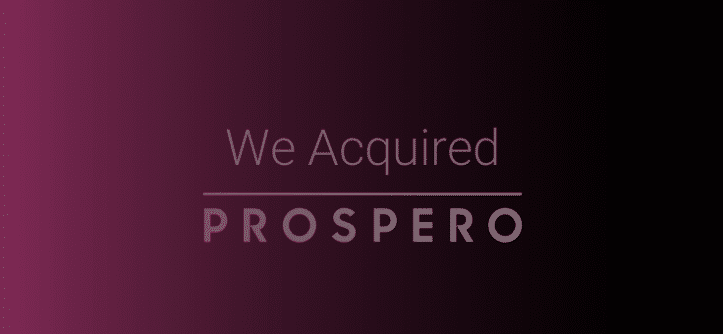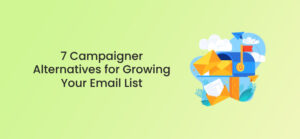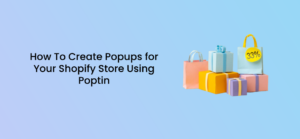TL;DR – Two weeks ago we acquired Prospero, a platform for creating proposals easily. Proposals that look good, save freelancers and agencies a lot of time, and also increase the chances of closing a deal.
We knew Prospero’s story from the start. In fact, their launch story was one of the posts we read in depth to inspire our launch on Product Hunt.
Prospero finished # 2 that day, and today the product has over 1,400 votes.
Here is Prospero’s story in a video:
How did we get to it?
Our in-house designer at the time, Avi Whol, watched an episode on Ran Segall’s channel where Ran said they were looking for a partner in the field of marketing / business development to help them skyrocket Prospero’s growth.
(A moment of objective recommendation – if you are a designer, Ran YouTube’s channel has 63K followers and the episodes there can certainly help you take your freelancing business to the next level).
In fact, I had a few short conversations with Ran beforehand, so I saved both of us the small talk and went straight to the point:

Sorry it is in Hebrew, but I basically asked him if they’d sell.
From there, we had more conversations, sharing data, phone calls, a meeting that included architecture & code review with Ran Margaliot (who is a rockstar and one of the founders of Commun.it), negotiations … and signing. 😎
Although I summed it up in two and a half rows, but it took a few good months 😅
This is the email Ran sent to Prospero’s customers:
Subject: Prospero has new owners & a brighter future!
TL;DR – Prospero is now owned by a new team, nothing changes for you, your account or proposals.
Full story –
As some of you know, Prospero was built & operated by a bootstrapping designer (Ran) & developer (Ayal).
We have supported the starting & running of the company by freelancing and as time went by, doing that while trying to make Prospero better, and giving you good service became very hard (if you’ve sent me a message that went unanswered, I apologize deeply).
Few months ago, we realized we cannot continue supporting Prospero ourselves. As the community of our customers (that’s you!) means a lot to us, we did not want to shut down the service, and started looking for a partner who’d want to pick up where we left, and continue to invest in making the product better and giving you a great experience.
When we met with Tomer & Gal, we knew we had the right match. The guys have already built one successful online product (called Poptin), and were looking to expand into the proposals space as well.
Today we are transferring the ownership to them, with the hopes that you’ll benefit from a better product & customer experience. As we’re mentioned above – there will be no changes to your account, pricing or your current proposals.
If you have questions, please reply to this email and Tomer & Gal will try to provide clear answers.
We had a pleasure serving you.
Ran & Ayal.
PS – Tomer & Gal have big plans for Prospero in 2019, more details soon.
Why buy an existing product? How do we make sure a product is good?
So first of all, we were anxious to build a large side project parallel to Poptin. A few months before, we had thought about a lot of ideas and even created full specifications for two projects, but in the end we abandoned them for various reasons.
At the same time as Poptin among others we are running Premio and we have employed a new employee dedicated only to that.
Okay, so why buy and not build from scratch?
Or: How do we validate and prioritize ideas?
- The idea of creating beautiful proposals fast is not a new idea, and that’s part of what we love about it. There are already competitors and successful companies that do this, which means that there is a big market and there are people who get a real value from these tools and are willing to pay for it.
- Besides, Prospero already reached a nice MRR and beyond proving POC (Proof of Concept).
- We are always prefer products that are stand-alone. What does it mean?
Products that do not depend on third parties and can exist without the fear from the big companies (Google, Facebook, Amazon, Twitter, LinkedIn, etc.).
In the past, we already started developing a product that was entirely build on Facebook platform, and as we developed the product and after we had already put in $7000, Facebook changed tehir policy and we had to give up the idea (our potential competitor, who got funds of $2M closed the buinsses the same day). - Acquiring an existing product saves a lot of time and uncertainty.
Building a new product requires a lot of resources, strategy building, manpower and time (which is the most expensive resource here). We would have to sit down and specified everything from scratch, design the interface, interview users, find a programmer (and pay him/her X good months to develop a normal MVP), start marketing and another 1001 things.
Although we still had to find a programmer to lead the development,but for all the other things we already have a good infrastructure and a lot of lessons that we take with us from managing Poptin. - Another reason we were confident in the deal was the people behind Prospero. A short meeting or conversation with Ran and Eyal (and also with Lior who was part of Prospero in the first year) is enough to understand that Prospero was built in high standards.
- This is a field that we have a good knowledge and interest in. Even though we’re talking about ‘sales’ rather than ‘marketing’, we did not buy a company from the IOT or VR field, and our knowledge (and the motivation to learn it) are close to zero. This is a system that if we were familiar with it in those days when we sent dozens of bids to the promotion customers as a digital agency, we would be happy to use it.
Besides these points, we have a table in which we write each idea in each column, and each row has another parameter that will influence the decision whether to move forward with the idea or not. For each such parameter, we give a score from 1 to 5, and in the end we sum up.
Such parameters can be:
- An evergreen product – a product that is not trendy and it’s hard for us to imagine that people will stop using it for the next X years.
- Type of customers – are these customers fun to serve or not?
- Is it possible to scale the product from a paid campaigns (Google, Facebook, etc.)?
- Technological depth and is technical support simple or complex?
- Is the market educated (and are there competitors, if not, then maybe the idea is not so good)?
- Infrastructure and maintenance costs.
- Market size and more.
Prospero’s Roadmap
If you sign up and play a bit with the interface, you’ll see that you can create a beautiful proposal within a few minutes. Prospero does it already, and does it well.
From the beginning of 2019 we intend to expand Prospero and add:
- More ready-made-texts for other services provided by digital agencies
- An ability to add users
- Payment methods (credit card transactions and not only PayPal like today)
- Zapier and other relevant software integrations
- More blocks options (suitable for creating Contracts as well)
- Affiliate program
- And of course listen to users, get feedback and suggestions, and give a hands-on service, just like we already do with Poptin.
So how do ‘cool’ people say?.. Stay tuned! 😄




